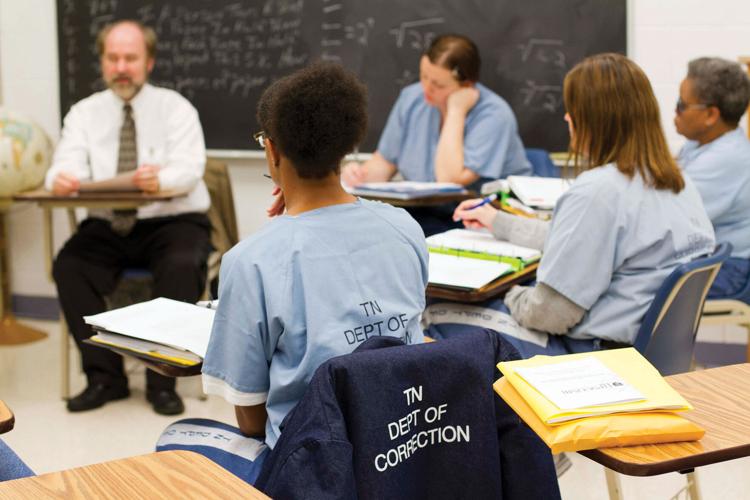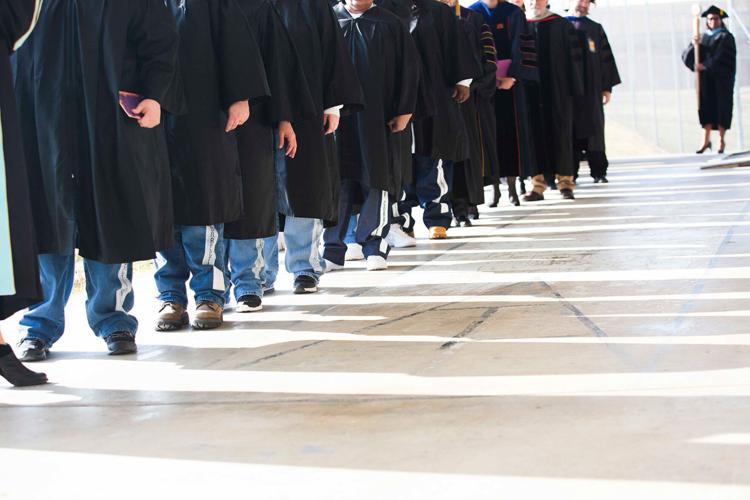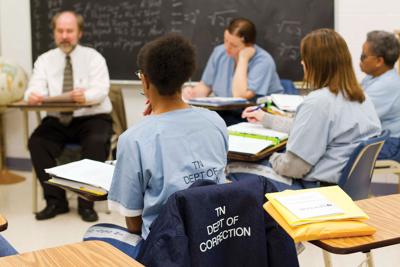Of all the institutions that COVID-19 disrupted, education has been among the most significant and complicated to sort out. From universities navigating quarantine guidelines to conflict over mask mandates in public schools, students of all ages have been, and continue to be, affected by the pandemic. A group of learners who have been affected but not widely discussed is those who are incarcerated.
Each year, thousands of incarcerated people throughout Tennessee rely on prison education programs to gain learning opportunities and job qualifications. The Tennessee Department of Correction offers three different pathways for education — adult basic education, career technical education and post-secondary education. Residents of some Tennessee prisons can also use programs created by organizations like the Tennessee Higher Education in Prison Initiative.
But like so many other fields, educational programming had to manage the initial implications of COVID-19. In prisons, this was an especially hard task, as access to technology and other resources is significantly limited. As prisons were gauging the extent of the pandemic’s effects in those early months, education programs had to adjust, and some had to pause momentarily — though when and for how long varied across different prisons and programs. Sixty incarcerated people died from COVID-19 in Tennessee prisons in 2021, along with another seven Tennessee Department of Correction staff members.
“Just like in the community where school was moved to an alternate solution, so were the programs in our facilities,” says Tennessee Department of Correction spokesperson Sarah Gallagher. “It made it a little bit more challenging because, while the public is able to switch to virtual, our offenders have limited access to the internet, so that made it really difficult. But the educators got really creative, and they printed off work and they provided textbooks, and the offenders really stepped up and continued their education as well.”
One formerly incarcerated woman, who wishes to remain anonymous, stuck through the challenges of the pandemic and earned a graduate degree that she started in prison through the Lipscomb Initiative for Education program. Since 2007, Lipscomb has been offering college degrees to residents of the Nashville women’s prison Debra K. Johnson Rehabilitation Center; the program was later extended to residents of the Riverbend Maximum Security Institution. The program offers Associate of Arts and Bachelor of Professional Studies degrees and, starting in 2018, a Master of Arts in Christian Ministry degree. This woman was in the first cohort of students seeking the LIFE program’s graduate degree. While her former classmates are still working toward graduation, she was able to receive her degree earlier because she was released and finished her final semesters on Lipscomb’s campus.
“It was extremely difficult, but you did what you had to do,” she tells the Scene of taking her classes in prison. “Like, if you were determined to get it done, then you just did it. But it was hard. I mean, if you were a person that needed the professor there or needed to ask a lot of questions, it was really hard.”
Earning a degree in prison looks very different from earning one on campus. A semester is stretched out much longer since Lipscomb’s students “on the inside” — as LIFE representatives sometimes put it — can take only a single two-hour class each week. LIFE consultant Kate Watkins says it can take up to 14 years to earn a bachelor’s degree via Lipscomb’s program. Earning an associate degree takes up to seven years, and the master’s program takes around four. On top of that, incarcerated students don’t have access to the resources of traditional students, such as internet or office hours with instructors. Our source, who tells the Scene she resided in the Johnson Rehabilitation Center’s transition facility in the final years of her sentence, had to cross the street and go through multiple levels of security to get to and from her classes in the main facility. If she needed a book for an assignment, she had to request it from the main facility, which could take days.
When the pandemic arrived, it set Lipsomb’s students back, but the LIFE program continued to facilitate classes by dropping off and picking up homework packets. Though classes had to be paused in the 2020 summer semester, the LIFE program facilitated a kind of book club in which students read a book and engaged the faculty about it via correspondence. Watkins says those early months were a bit “messy.”

Lipscomb's Life initiative
“It wasn’t perfect, but what we learned was, for the inside students who had no volunteers coming in, we remained a connection to the outside.” says Watkins.
In-person visitation and volunteer services paused for months in Tennessee’s prisons, limiting connections with family members and others. By the fall 2020 semester, which began in August of that year, Lipscomb’s students were able to resume their studies with Zoom classes — a teacher spoke by video screen to a room of incarcerated students who were spread six feet apart. Anyone who had a question would walk up to a screen to ask the instructor. No extra class time was given to students to make up for the COVID-19-related adjustments, though Watkins notes that TDOC did help the LIFE program facilitate Zoom classes. Sometimes, however, classes would be canceled at both Johnson and Riverbend because of COVID-19 outbreaks. In-person classes were able to pick up again in summer 2021 for LIFE students. If they have to transition back to Zoom classes again, Watkins says they will be better prepared than the first go-around.
Despite the setbacks, and like education institutions at all levels, students and educators made do the best they could given the circumstances. Though the LIFE students were set back a semester, students maintained a connection to the outside and academic engagement through the program. The formerly incarcerated source whom the Scene spoke to was able to complete her graduate degree on Lipscomb’s campus through a scholarship, and she says that Lipscomb was “a huge part” of her reentry into society.
“Now that I have my [master’s] degree I plan to just continue to work with men and women and advocate as well as I can so that those that come out will be able to basically reintegrate into society as best as possible,” she says. “Because you don’t know the things that you need until you need them.”







